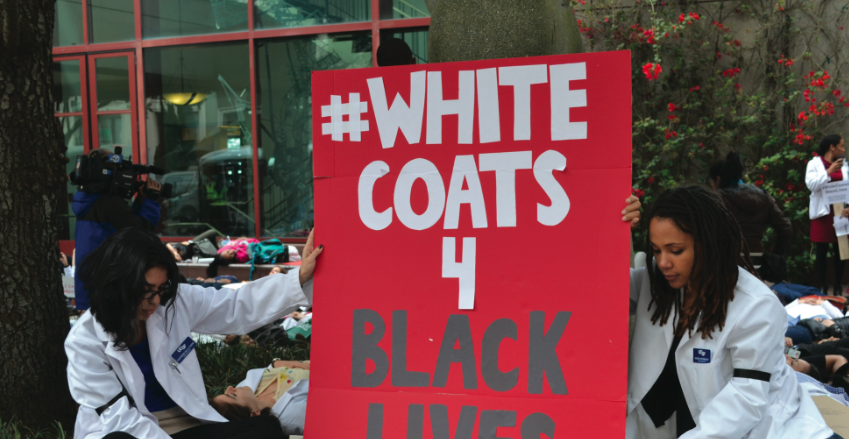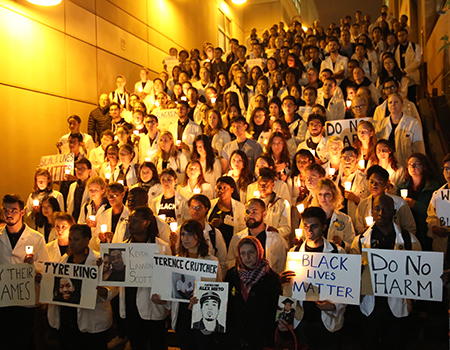Student Advocacy
Learner activism is a vital part of UCSF’s success. UCSF has a rich history of student activism that has helped shift the conversation about racism and health equity at the institution and nationwide. Over the years, faculty leaders and staff have partnered with student leaders to spur meaningful change at UCSF. Below are just a few examples.

December 10, 2014: White Coats for Black Lives Die-In
In the wake of decisions on the Michael Brown and Eric Garner cases in late 2014, UCSF medical students organized a national “White Coats 4 Black Lives” Die-In. Students sought to spread awareness of the health issues presented by violence and racism and to organize a Town Hall meeting to share reflections on violence, racial bias, and personal experiences with diversity at UCSF.
As a result of the Student Die-in, Dean Talmadge King and Executive Vice Dean Catherine Lucey launched Differences Matter in 2015, a multi-year, multimillion-dollar initiative designed to make UCSF the most diverse, equitable, and inclusive academic medical system in the country. The School of Medicine has just committed to funding another five years of this initiative.
- Learn how the 2014 Die-in continues to create change at UCSF
April 30, 2016: Standing with the Frisco Five
UCSF medical students provided medical care and stood as activists alongside the Frisco Five, hunger strikers protesting police violence in San Francisco. Medical students joined the hunger strikers in a march to City Hall and a campaign of action denouncing police violence as a critical public health issue. The White Coats for Black Lives movement and the PRIME-US program led and facilitated UCSF learner involvement, with other students participating as well.
- Learn more about students standing with the Frisco Five
2017: White Coats for Black Lives Releases Racial Justice Scorecard
UCSF was one of the founding chapters for the national student organization White Coat for Black Lives (WC4BL). The organization began releasing racial justice scorecards rating schools on their response to racial justice. The annual racial justice score card led to important changes and accountability at UCSF, including increasing faculty diversity, modifying patient cases in the Bridges Curriculum to be more representative, and discussions at the campus level about policing and better community engagement.
- Learn more about the UCSF Chapter of White Coats for Black Lives (WC4BL).
- Learn more about the national White Coat for Black Lives (WC4BL)
December 3, 2018: Medicine for Migration Week
UCSF medical students helped organize a coordinated week-long effort called “Medicine for Migration” in which thousands of students and physicians at 29 institutions took part in over 50 advocacy events to stand with immigrant communities. The demonstration was in response to unjust immigration policies and a proposed expansion of the definition of public charge. “Public charge” is a pejorative used to describe people applying for legal residence perceived as overly dependent on government services, rendering them ineligible for their green card or visa.
- Learn more about Medicine for Migration
- Medicine for Migration Facebook page
July 2020: Student National Medical Association and WC4BL demands change in response to George Floyd’s Murder
In the wake of George Floyd’s murder, the UCSF chapter of the Student National Medical Association and White Coats 4 Black Lives issued a series of requests to the school, leading to conversations about how the school could accelerate its anti-racism efforts and respond to national trauma. These discussions led to the launch of the school’s Anti-Oppression Curriculum Initiative, establishment of the UCSF Racial and Sociopolitical Trauma Protocol, and passing the Equity in Assessment policy.
The outpouring of student activism on campus led to the formation of the UCSF Anti-Racism Initiative.
Learn More About:
- Anti-Oppression Curriculum Initiative
- Equity in Learning and Assessment Policy
- UCSF Anti-Racism Initiative

May 28, 2021: APAMSA Issues Call for Change Regarding Anti-Asian Hate
The Asian Pacific American Medical Student Association (APAMSA) contributed to a campus-wide call for change to address Anti-Asian hate in the wake of the COVID-19 pandemic. Calls for reform included a request for additional translation services on campus and in UCSF hospitals.
October 1, 2021: Call to Redesign Anti-Racism Topics in Curriculum
Medical students called upon the School of Medicine to revise the way anti-racism topics are taught in the curriculum and called upon the school to bring in anti-racism experts to redesign and teach components of the curriculum.
- Review the Accelerating Anti-Oppression Work in Medical Education Charter which was created in response to calls from students to change the way racial equity is taught and incorporated into our curriculum.
STUDENT AWARDS
- August 2015: UCSF Medical Students Receive Human Rights Award from City of San Francisco
- December 2020: School of Medicine Announces Commendations for COVID-19 and Anti-racism Work
- July 2021: UCSF Medical Students win University of California President’s Award for Outstanding Student Leadership for Anti-Racism Workshop
- October 2022: Jay Bindman (MS4) recieves Chancellor Award for Lesbian, Gay, Bisexual, Transgender, Queer and Intersex Leadership
Contact Us
Have a question?
